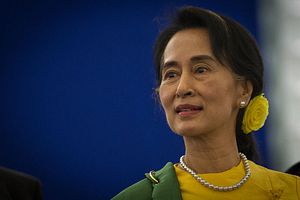Bangladesh Prime Minister Sheikh Hasina wants the international community to step up pressure on Myanmar, accusing the government of Aung San Suu Kyi of “not taking the initiative” to secure the security and repatriation of her own people.
Hasina’s comments are tied to a broader reality: that the repatriation of some 700,000 refugees who fled Myanmar’s troubled northern Rakhine state across the border into Bangladesh, after a campaign of violence likened by the United Nations to “ethnic cleansing,” is predictably running far from smoothly.
Hasina says the names of 8,000 families have been submitted, but Myanmar had failed to take them back. New York-based Human Rights Watch says only 600 people on the list of 8,000 have been verified, while another list of 10,000 was being prepared.
That came after Myanmar claimed to have taken the first family back, which was described as a farce by Bangladesh’s refugee commissioner, Abul Kalam, who said the family had never left Myanmar in the first place.
Those claims were backed by human rights groups, which also cast doubts over the validity of the first repatriation. The issue went largely ignored by politicians in neighboring countries making up the 10-member Association of Southeast Asian Nations.
Andrea Giorgetta from the International Federation for Human Rights told Agence-France Presse that the repatriation announcement was “a public relations exercise in an attempt to deflect attention from the need for accountability for crimes committed in Rakhine State.”
“Before proceeding with the repatriation of Rohingya, the Myanmar government must recognize and guarantee all their fundamental human rights,” he told the news agency, calling for independent monitoring and the return of lost property and homes.
Another issue confronting the Rohingya is the pending wet season and their location on hill tops prone to mudslides. With some 100,000 Rohingya refugees said to be moved to an uninhabited low-lying island in the Bay of Bengal, that has added to fears about their fate.
The dispute over repatriation arose as a boatload of Rohingya looking for sanctuary was taken in by Malaysia. It was the first vessel spotted by the authorities in more than a year and raised fresh fears that another exodus out of Myanmar could be on its way.
To be sure, despite these grim realities, there are a few signs that at least some justice is being served. For instance, seven military personnel were jailed for up to 10 years with hard labor for their role as accomplices in the killing of 10 Rohingya Muslims in Rakhine. They were also expelled from the military.
But at the same time, while any action in response to the allegations of rape, torture, and murder of the Rohingya should be welcomed, efforts to find some kind of justice have fallen far short of international expectations, prompting calls from countries such as Canada and Britain for an urgent investigation.
“The Burmese authorities need to demonstrate that they are serious about the safety and security of the Rohingya,” British Foreign Secretary Boris Johnson said after co-hosting with his Canadian counterpart Chrystia Freeland a roundtable on the crisis at the recent Commonwealth Heads of Government meeting in London.
“A credible independent investigation into reported atrocities is an important step in the process,” Johnson said of a crisis that has dominated world headlines and badly tarnished the image of Suu Kyi, the Nobel laureate elected to power in historic elections.
Details of those atrocities are still emerging and have resulted in Myanmar’s military being blacklisted by the United Nations as being “credibly suspected” of carrying out sexual violence.
According to research by lawyer Sultana Razia, a specialist in trauma, mass rape, and trafficking of Rohingya girls and women, Myanmar troops raped more than 300 women and girls, some as young as six, in 17 villages in Rakhine.
“With over 350 villages attacked and burned since August 2017, this number is likely only a fraction of the actual total number of women raped,” she told a UN debate on the prevention of sexual violence in conflict.
She said this latest crisis could have been avoided if warning signs since 2012 had not been ignored. Doctors Without Borders has estimated that said 6,700 Rohingyas were killed within the first month alone of the crisis.
Luke Hunt can be followed on Twitter @lukeanthonyhunt
































